|
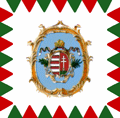 3/15/2009 - AHF of Washington, DC's Commemorates the 1848 Hungarian Revolution and War of Liberation. The Chapel at Wesley Theological Seminary at American University
in Washington, D.C., was once again the setting for AHFDC's annual commemoration of the 1848 Hungarian Revolution and War of Liberation in which Hungary sought to establish a democratic republic and split with Austria under its leader Louis Kossuth. This year, speakers focused on 3/15/2009 - AHF of Washington, DC's Commemorates the 1848 Hungarian Revolution and War of Liberation. The Chapel at Wesley Theological Seminary at American University
in Washington, D.C., was once again the setting for AHFDC's annual commemoration of the 1848 Hungarian Revolution and War of Liberation in which Hungary sought to establish a democratic republic and split with Austria under its leader Louis Kossuth. This year, speakers focused on 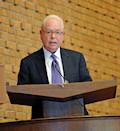 the significance of the 1848 revolution and how its ideals and goals relate to the political climate in today's Hungary. the significance of the 1848 revolution and how its ideals and goals relate to the political climate in today's Hungary.
Zoltan Bagdy, AHF Co-President and Chair of its Cultural Affairs Committee, welcomed guests who then opened the ceremonies by singing the nationalanthems of the UnitedStates and Hungary. Hungarian 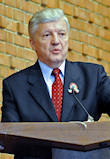 Ambassador Dr. Ferenc Somogyi also delivered a welcoming address. Ambassador Dr. Ferenc Somogyi also delivered a welcoming address.
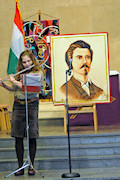 Members of the the The 4th Bátori József Hungarian Scouts Troop of Washington, DC, were a major part of the program. Krisztina Nyerges performed a flute solo of Vivaldi's "Largo." She was followed by Emõke Tóth who recited the "Nemzeti Dal." Ferenc Koszorús III recited "Reflections," and Sebestyén Szõllõs performed a piano solo of Liszt's Sohaj (etude). Members of the troop gave additional readings. Members of the the The 4th Bátori József Hungarian Scouts Troop of Washington, DC, were a major part of the program. Krisztina Nyerges performed a flute solo of Vivaldi's "Largo." She was followed by Emõke Tóth who recited the "Nemzeti Dal." Ferenc Koszorús III recited "Reflections," and Sebestyén Szõllõs performed a piano solo of Liszt's Sohaj (etude). Members of the troop gave additional readings.
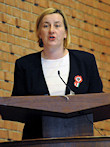 This year's keynote address entitled, “Erők a Háttérben,” (the powers in the background) was given by the Rev. Judit Mayer who commented that today's politicians could learn from the heroes of 1848 who put the nation ahead of their own personal political agenda. She said: This year's keynote address entitled, “Erők a Háttérben,” (the powers in the background) was given by the Rev. Judit Mayer who commented that today's politicians could learn from the heroes of 1848 who put the nation ahead of their own personal political agenda. She said:
"A politikai önzetlenség példáját jellemzi, hogy március 15-én a később "márciusi ifjaknak" nevezett fiatalok átengedték a vezetést a mérsékelt liberálisok vezéregyéniségeinek, akik ismertebbek és elfogadhatóbbak voltak a polgárok számára. Nem a saját politikai vágyaik kielégitése volt a mérvadó, hanem az, hogy mi jó a nemzetnek. A mai politikusok közül sokaknak talán róluk kellene példát venni."
She added, "Az itteni magyarság is fogy, elég csak megnézni, hány és hány magyar templom, klub zárja be a kapuit, s akik még magyarnak vallják magukat, sokan közülük már nem beszélik a nyelvet. Mi tehát az üzenet, amit ma, március 15-én elvihetünk magunkkal? Mit tanulhatunk hős eleinktől, és mit örökitünk tovább gyermekeinknek, unokáinknak?
Talán azt, hogy amikor a nemzet, a haza szenved, amikor az elnyomás olyan súlyos, hogy mind a mindennapi életben, mind pedig a lélek, a lelkiismeret nyugalmában zavar támad, akkor lehet, és kell tenni ellene. Szólni kell, s ha a szó nem elég, tenni kell. Hogy mikor lesz egy megmozdulásból forradalom? S hogy kell-e forradalom? A választ talán az adhatja meg, hogy ha az a három erő, amiről beszéltünk, együtt, egy irányba mutat, akkor kell is, és lesz is. Pontosan mikor történik ilyen? Ezt csak a történelem Ura tudja."
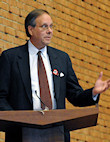 AHF Co-President and Public Affairs Committee Chair, Frank Koszorus, Jr. relayed a similar theme in his address entitled, "Reflections: Why do we Commemorate 1848?" where he explores American influences on Louis Kossuth and the 1848 revolution and the need to honor Hungary's proud heritage and committment to democracy through work that promotes the same ideals advanced by Kossuth and the heroes of 1848. He remarked: AHF Co-President and Public Affairs Committee Chair, Frank Koszorus, Jr. relayed a similar theme in his address entitled, "Reflections: Why do we Commemorate 1848?" where he explores American influences on Louis Kossuth and the 1848 revolution and the need to honor Hungary's proud heritage and committment to democracy through work that promotes the same ideals advanced by Kossuth and the heroes of 1848. He remarked:
"So then it becomes self evident that one reason we commemorate today is to preserve a proud heritage and honor those who by their actions wrote a history, to which, in Theodore Roosevelt’s words, 'the whole civilized world is indebted.'
But there is another equally if not more compelling reason. Rackoczi, Szechenyi, Petofi, Kossuth, the Hungarian heroes (not just the foreign ones) who helped save lives during the Holocaust, Nagy Imre and the Pesti srac of 1956 and the democrats of twenty years ago who abolished an oppressive form of government, just to mention a few, guide and inspire us. The example of their principles and tremendous sacrifice for freedom, liberty and independence impose a special responsibility on us to help strengthen democracy, human rights and minority rights throughout the Danubian region by speaking up for the democratic values championed by Kossuth and the Hungarian patriots of the Ides of March.
Senator Joseph Tydings, the American Hungarian Federation’s guest speaker on the occasion of our 50th anniversary commemoration of the 1956 Hungarian Revolution, remarked, 'you can’t allow the flame of liberty to dim, flicker and die. Hungary needs your Federation. The United States needs a free and democratic Hungary.'"
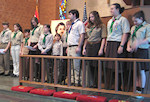 The scouts ended the program with "Kossuth Dalok" (Kossuth Songs) and the Rev. László Petró closed the ceremonies. The scouts ended the program with "Kossuth Dalok" (Kossuth Songs) and the Rev. László Petró closed the ceremonies. 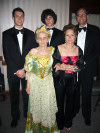 AHF expresses sincere thanks to Gabriella Koszorus Varsa, the artist responsible for the Petofi painting seen at the commemoration, for her years of dedication to AHF and the community. Gabriella, recipient of AHF's highest award, the Michael Kovats Medal of Freedom, passed away in 2007. AHF expresses sincere thanks to Gabriella Koszorus Varsa, the artist responsible for the Petofi painting seen at the commemoration, for her years of dedication to AHF and the community. Gabriella, recipient of AHF's highest award, the Michael Kovats Medal of Freedom, passed away in 2007.
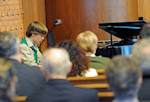 
 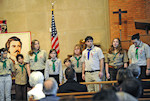
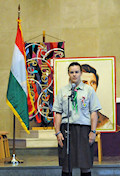 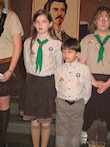
Join online!

[back to all 1848 news] |
 In a related note, President Obama congratulated Hungary on its National Day and anniversary of its 1848 War of Liberation... "Today we honor the courageous Hungarians who set their country on the path to freedom.The legacy of the revolution continues to inspire as Hungarians advocate for freedom's cause," he said. [Download his letter]. In a related note, President Obama congratulated Hungary on its National Day and anniversary of its 1848 War of Liberation... "Today we honor the courageous Hungarians who set their country on the path to freedom.The legacy of the revolution continues to inspire as Hungarians advocate for freedom's cause," he said. [Download his letter].
Shortcuts:
Famous Quotes
"the house of Habsburg-Lorraine, perjured in the sight of
God and man, had forfeited the Hungarian throne."
Hungary, April 1849
"All for the people and all by the people. Nothing about
the people without the people. That is Democracy, and that is the ruling
tendency of the spirit of our age."
Spoken before the Ohio State Legislature,
February 16, 1852
About Louis
Kossuth
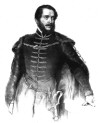 Kossuth
Lajos (b. 1802, d. 1894, pronounced co-shoot luh-yôsh)
was Governor of Hungary during fight for independence and democracy which
was eventually defeated by the union of the royalist Austrian Habsburg
and Russian Czarist Armies (1848 - 1849). Kossuth envisioned a federation
in the Kingdom of Hungary in which all nationalties participated in a
vibrant democratic system based on fundamental democratic principles such
as equality and parliamentary representation. The bloody conflict eventually
led to a great compromise known as the "Austro-Hungarian Empire,"
in which Hungary gained some autonomy. although Kossuth would have no
part in it and demanded full indepependence until his death. Kossuth
Lajos (b. 1802, d. 1894, pronounced co-shoot luh-yôsh)
was Governor of Hungary during fight for independence and democracy which
was eventually defeated by the union of the royalist Austrian Habsburg
and Russian Czarist Armies (1848 - 1849). Kossuth envisioned a federation
in the Kingdom of Hungary in which all nationalties participated in a
vibrant democratic system based on fundamental democratic principles such
as equality and parliamentary representation. The bloody conflict eventually
led to a great compromise known as the "Austro-Hungarian Empire,"
in which Hungary gained some autonomy. although Kossuth would have no
part in it and demanded full indepependence until his death.
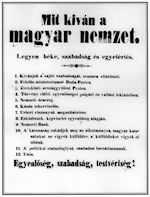 The speech from which the above excerpt is taken was given over a decade
before Lincoln's famed "for the people, by the people" speech
given at Gettysburg in 1863. Kossuth was the first foreign Statesman officially
invited to the US since the Marquis de Lafayette. His upcoming speech
in the Congress of the United States made the pre-civil war joint house
nervous due to his democratic views on equality of all men. Kossuth learned
English while in prison and exile and spoke to half the population of
the US who enthusiastically greeted and flocked to hear him. Despite Hungary's
epic struggle and Kossuth's brave and noble efforts, the US, the "Bastion
of Democracy" turned him away, empty handed. Hungary was alone again
in its fight for democracy in 1956, and didn't gain freedom until 1989. The speech from which the above excerpt is taken was given over a decade
before Lincoln's famed "for the people, by the people" speech
given at Gettysburg in 1863. Kossuth was the first foreign Statesman officially
invited to the US since the Marquis de Lafayette. His upcoming speech
in the Congress of the United States made the pre-civil war joint house
nervous due to his democratic views on equality of all men. Kossuth learned
English while in prison and exile and spoke to half the population of
the US who enthusiastically greeted and flocked to hear him. Despite Hungary's
epic struggle and Kossuth's brave and noble efforts, the US, the "Bastion
of Democracy" turned him away, empty handed. Hungary was alone again
in its fight for democracy in 1956, and didn't gain freedom until 1989.
Today, there are many reminders of Kossuth's impact on America and the
world. In North America, there is a Kossuth County in the state of Iowa,
a town with his name in Indiana, Ohio and Mississippi,
a settlement with a Kossuth Post Office is in Pennsylvania. In addition,
there are Kossuth statues and plaques in New York, Cleveland, Akron, New
Orleans, Washington, and Ontario, Canada. The Hungarian
Reformed Federation's building on Dupont Circle, in Washington, DC
is called Kossuth House with a memorial plaque commemorating his speech
on democracy. See the picture gallery and memorials on Louis
Kossuth in North America.
The renowned Ralph Waldo Emerson said in greeting Kossuth on his arrival
at Concord, MA, May 11, 1852:
"[we] have been hungry to see the man whose extraordinary eloquence
is seconded by the splendor and the solidity of his actions."
Kossuth was greeted with wild enthusiasm across the country. He was only
the second foreign leader (second to Lafayette) to address a joint session
of Congress. The American Hungarian Federation
dedicated a bust that now sits proudly in the US Capitol - it reads, "Louis
Kossuth, Father of Hungarian Democracy" [read more]
Audio
Resources
 Hear
Louis Kossuth Speak!
[Click Here] - This is the speech of Louis Kossuth which he gave for the dedication of the statue for the 13 Hungarian generals, who were executed at Arad, Hungary, on October 6, 1849 (Arad is in Rumania today after annexation due to the Treaty of Trianon in 1920 ).
Louis Kossuth was exiled after the fall of the Hungarian Liberation Fight of 1848 and made his permanent home in Torino (Turin), Italy. He could not attend the dedication of the monument at Arad, without risking arrest, so he recorded his speech inTurin, and sent it to Arad using the new technology of sound recording, called the phonograph. Hear
Louis Kossuth Speak!
[Click Here] - This is the speech of Louis Kossuth which he gave for the dedication of the statue for the 13 Hungarian generals, who were executed at Arad, Hungary, on October 6, 1849 (Arad is in Rumania today after annexation due to the Treaty of Trianon in 1920 ).
Louis Kossuth was exiled after the fall of the Hungarian Liberation Fight of 1848 and made his permanent home in Torino (Turin), Italy. He could not attend the dedication of the monument at Arad, without risking arrest, so he recorded his speech inTurin, and sent it to Arad using the new technology of sound recording, called the phonograph.
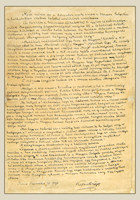 The recording was made on September 20, 1890, when Kossuth was 88 years old. It is a sad fact that the monument Kossuth sent his speech for was torn down by the Rumanian government when they annexed Transylvania, along with Arad, in 1920, after World War I. The recording was made on September 20, 1890, when Kossuth was 88 years old. It is a sad fact that the monument Kossuth sent his speech for was torn down by the Rumanian government when they annexed Transylvania, along with Arad, in 1920, after World War I.
The original
recording on two wax cylinders for the Edison phonograph survives to this
day, although barely audible due to excess playback and unsuccessful early
restoration attempts. Lajos Kossuth is the earliest born person
in the world who has his voice preserved. Since the audio
is of such poor quality, here is it is transcribed in Hungarian and translated
to English (special thanks to Louis
Kossuth in North America)
Hungarian |
English |
| "A világ bírája
a történelem fog e kérdésre felelni. Legyenek
a szentemlékû vértanúk megáldottak
poraikban, szellemeikben a hon szabadság Istenének
legjobb áldásaival az örökkévalóságon
keresztül; engem ki nem borulhatok le a Magyar Golgota porába,
engem október 6-a térdeimre borulva fog hontalanságom
remete lakában látni a mint az engem kitagadott Haza
felé nyújtva agg karjaimat a hála hû
érzelmeivel áldom a vértanúk szent emlékét
hûségükért a Haza iránt, 's a magasztos
példáért, melyet az utódoknak adtanak;
's buzgó imával kérem a magyarok Istenét,
hogy tegye diadalmassá a velõkig ható szózatot,
mely Hungária ajkairól a Magyar Nemzethez zeng. Úgy
legyen Ámen!
Turin
September 20 1890
Kossuth Lajos |
"The judge of the universe,
history, will decide over this question. Should the saintly remembered
martyrs be hallowed in their ashes, in their spirit with the highest
blessings of the Lord of Liberty and through eternity; I can not
pay my sympathies to the ashes of the Hungarian Golgotha, but October
6 will find me on my knees in this reclusive home of exile, as I
open my arms to my disowning homeland. With gratitude's faithful
sentiments, I bless the martyrs' sacred memory for their faith in
their homeland and for the sublime example they left to their heirs:
with ardent prayer I beg the God of Hungarians to make their appeal
which echoes from the lips of Hungaria to the Hungarian Nation.
So be it, Amen!
Turin
September 20 1890
Lajos Kossuth |
|
|
Click to hear the recording: |
"Kossuth Lajos azt üzente,
elfogyott a regimentje.
Ha még egyszer azt üzeni,
mindnyájunknak el kell menni,
Éljen a magyar szabadság,
Éljen a haza ! |
Esik esõ karikára,
Kossuth Lajos kalapjára.
Valahány csepp esik rája,
Annyi áldás szálljon rája,
Éljen a magyar szabadság,
Éljen a haza!" |
Links
- AHF and the Kossuth Bust in the US Capitol
- AHF commemorating 1848
- President Bush Honors 1848 and Hungary's Contributions to Democracy
- HRFA's excellent Kossuth in America [visit]
- Select Speeches of Kossuth, Condensed and Abridged, with Kossuth's
Express Sanction [visit]
- Louis Kossuth, Mason And Apostle Of World Democracy [visit]
- Count Apponyi's Oration on the Death of Louis Kossuth [visit]
- Wikipedia - [visit]
and add your thoughts!
- Louis Kossuth in North America [visit]
- Kossuth County, Iowa [visit]
- Kossuth County, Iowa statue dedication
[visit]
- Dedication of statue to replace one destroyed by Rumanian occupation
forces in 1921: Gyergyócsomafalva, Transylvania [visit]
 Sign
up for the AHF mailing list. Sign
up for the AHF mailing list.
Your information is not shared!
Join online!

|



